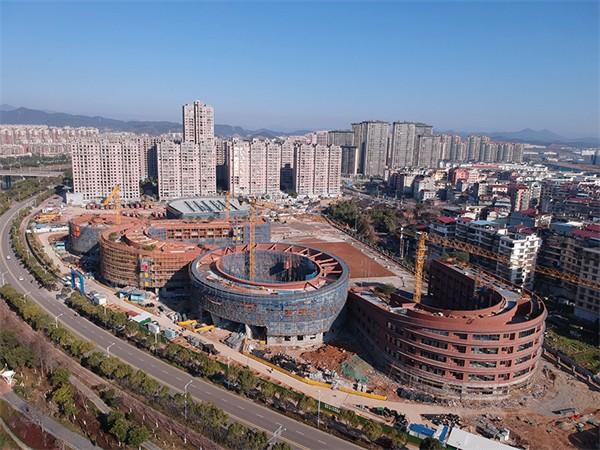China accelerates major projects to boost economy
- By Cui Can
 0 Comment(s)
0 Comment(s) Print
Print E-mail China.org.cn, February 6, 2023
E-mail China.org.cn, February 6, 2023
Amid the noises of heavy machinery, major construction sites across China have resumed work after the Spring Festival holiday season from Jan. 21 to 27, in the hope of getting off to a good start in the new year.

The construction site of a school in Nanping city of East China's Fujian province, Jan. 30, 2023. [Photo/Xinhua]
Experts noted that the launch of major projects will bring a surge of orders for related companies, increase profits, and create more jobs. Moreover, it will help stabilize investment and hence contribute to China's economic recovery.
On the first work day in the Year of the Rabbit, Xiong'an New Area in northern China's Hebei province saw 43 new projects kicking off. The projects have a total investment of 41.6 billion yuan (US$6.17 billion), and cover various fields such as infrastructure, public service, and smart cities. In the southern Chinese city of Shenzhen, a groundbreaking ceremony of 266 construction projects with a total investment of 329.53 billion yuan was held on Jan. 29.
Provinces and cities across the country have also released their lists of major construction projects for 2023 and doubled down on their investments. For example, Shaanxi province launched 795 major projects for the first quarter of this year, increasing its total investment by 26.3% year on year to 564.6 billion yuan. And its annual investment is planned to reach 227.7 billion yuan, a year-on-year increase of 21.6%.
Hong Tao, a professor of the Beijing Technology and Business University, said that investment in new types of infrastructure and high-tech industries is a requirement in the national and local 14th five-year plans, and also a trend for future development.
Chengdu, the capital of southwestern China's Sichuan province, announced the launch of 900 major construction projects this year. Among them, 145 are key infrastructure projects with a total investment of 969.77 billion yuan.
Meanwhile, more capital has been directed toward high-end industries in coastal areas. According to an implementation plan for major projects in 2023 released by Zhejiang, the province will continue to improve the composition of investment and ensure that investment in high-tech industries grows faster than the overall investment growth rate.
"Developing high-end industries is essential for China to pursue innovation-driven development and the transformation of growth drivers," Hong said.
The cities' eagerness to speed up post-holiday construction is driven by the country's support for major construction projects as part of its efforts to sustain economic recovery, Hong noted.
To boost effective investment in major projects, cities and provinces are continuing to leverage the role of special-purpose bonds. Data shows that Hebei province has front-loaded 128.6 billion yuan of special-purpose bonds, an increase of 73.8% over last year. Ningbo city, Qingdao city, Henan province, and Fujian province have respectively approved 26.5 billion yuan, 31.9 billion yuan, 127.1 billion yuan, and 93.3 billion yuan of special-purpose bonds, up 93.4%, 54.1%, 55%, and 34.6% from the previous year.
Hong suggested that in addition to special-purpose bonds, China should stick to prudent monetary policy to drive investment in major protects through financial means. A proactive fiscal policy should also be in place to create better business environment for various players to tap into the domestic market.





